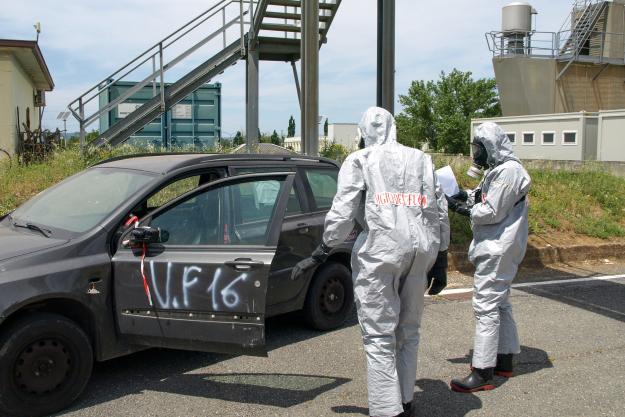
Participants practice approaching crime scene to conduct an invasive investigation.
During an invasive investigation, items may be moved to improve access and samples may be taken.
THE HAGUE, Netherlands—23 June 2022—In case of the use of chemical weapons or an incident involving toxic chemicals, it is essential for law enforcement personnel to have the knowledge and skills to manage a complex incident scene or environment
To help build capacity among law enforcement first responders, the Organisation for the Prohibition of Chemical Weapons (OPCW) organised the two final phases of a three-part training for law enforcement professionals. The trainings were conducted by the OPCW in partnership with the Italian National Authority’s Technical Operational Unit for the implementation of the Chemical Weapon Convention (CWC).
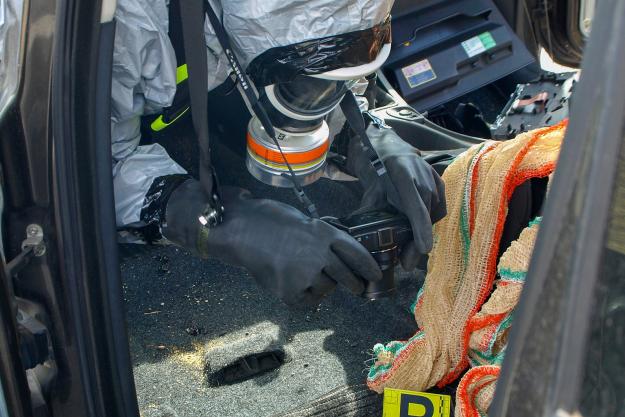
Participant practices photographing crime scene.
Photography is used during both invasive and non-invasive investigations. During a non-invasive investigation the crime scene is not touched. During an invasive investigation, objects may be moved and samples taken.
Evidence collection and sampling in a contaminated environment was covered during an online training held from 11 to 30 April for participants from the Economic Community of West African States (ECOWAS). The final training took place in person from 6 to 10 June in Montelibretti, Italy, and used practical exercises to reinforce the knowledge gained during the online trainings.
Opening the in-person training, Lt. Col. Gloria, Chief of the Italian National Authority’s Technical Operational Unit, addressed participants: “Considering that law enforcement officers are on the forefront when responding to chemical weapons and toxic industrial incidents, we believe that it is important to devote time and effort into trainings for law enforcement that address deterrence and prevention of the use of chemical weapons and toxic industrial chemicals. You have devoted a lot of time over the last seven months. This week’s training will apply the theoretical aspects of deterrence and prevention learned during earlier modules to field work.”
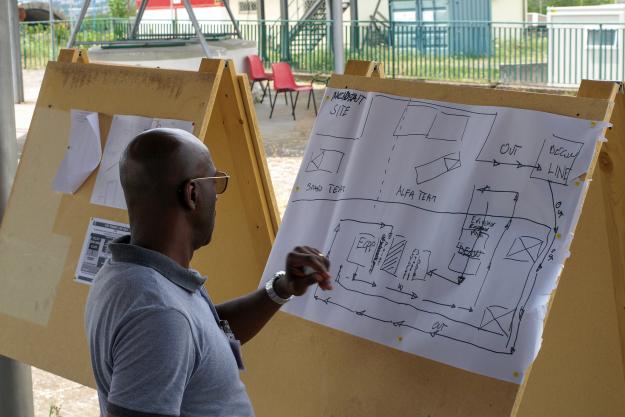
Participant reviews the sampling strategy plan.
Plan determines how investigators will enter and exit the crime scene and where evidence is taken after collection. The decontamination line is also clearly marked.
The OPCW expert responsible for the training, Mr Patrick Wengler, underlined: “Supporting skills development within the law enforcement community directly supports the implementation of the CWC. It offers a platform to discuss the deterrence and prevention of chemical weapons as well as the dual-use capacity of some toxic industrial chemicals. A sustained effort is required to ensure interest in the CWC among current and future first responders to enable development opportunities.”
Participants learned how to approach and collect different types of samples that could be found at the scene of a chemical incident as well as how to photograph evidence and relate the findings into a hypothesis. In addition, the course covered basic principles of the chain of custody, reporting and cataloguing procedures.
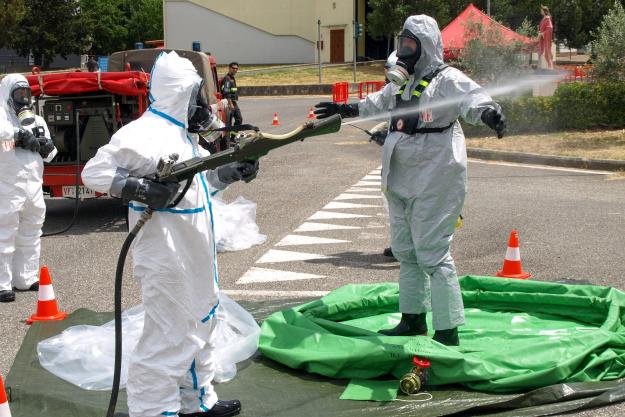
Participant practices decontaminating investigator who has exited the crime scene.
Level-3 PPE is a chemical resistant suit with respirator.
Participants integrated newly acquired knowledge, building on past experiences and exchanging points of views and practices. Participating law enforcement professionals and experts from the OPCW Technical Secretariat and the Italian National Authority also exchanged information and experiences regarding the implementation of Article X of the CWC (assistance and protection) and incident response.
The training involved close coordination and collaboration between multiple Italian organisations including the National Fire Brigade, the NBC Joint Defense School from the Ministry of Defence, and the Forensic and Bomb Squad of the Carabinieri.
The online workshop on Module 2 was attended by 16 professionals from nine OPCW Member States: Australia, Bosnia and Herzegovina, Cabo Verde, Ghana, Italy, Nigeria, Senegal, Togo, and the United Republic of Tanzania.
The in-person workshop on Module 3 was attended by 8 professionals from six OPCW Member States: Australia, Côte d’Ivoire, Ghana, Italy, Nigeria, and Senegal.
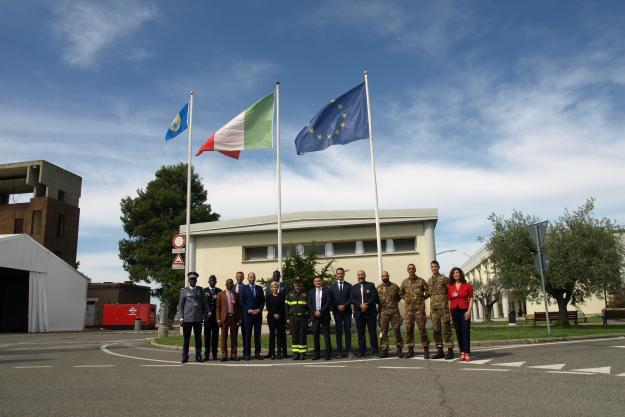
Participants, instructors, OPCW staff, and the Italian National Authority.
Background
As the implementing body for the Chemical Weapons Convention, the OPCW, with its 193 Member States, oversees the global endeavour to permanently eliminate chemical weapons. Since the Convention’s entry into force in 1997, it is the most successful disarmament treaty eliminating an entire class of weapons of mass destruction.
Over 99% of all declared chemical weapon stockpiles have been destroyed under OPCW verification. For its extensive efforts in eliminating chemical weapons, the OPCW received the 2013 Nobel Peace Prize.
More Information
- Ensuring Preparedness
- Article X of the Chemical Weapons Convention
- Photos from the event
- Italian National Authority
- National Operational Training School of the Italian Fire Fighters
- Italian Interarms Defence School for CBRN
- Italian Carabinieri
- Video: How does the OPCW help prepare for and respond to a chemical attack?
